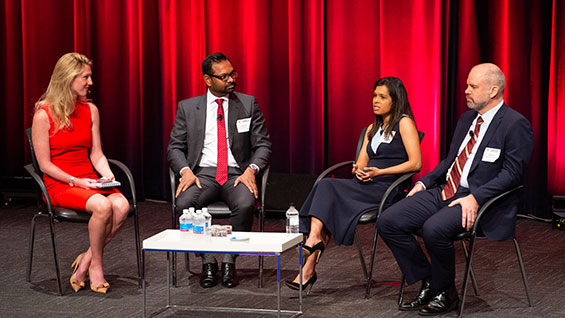
The tensions between the US and China are set to drag on, intensifying the risk of inflation and adding to the volatility reverberating across international markets, says a leading global asset manager.
But for those investors sitting on cash holdings, heightened volatility will present opportunities, says Vihari Ross, Magellan Asset Management's global portfolio manager.
Speaking at the Morningstar Individual Investor Conference in Sydney yesterday, Ross suggested US President Donald Trump's trade war with China had a two-fold motive.
On one hand, slapping tariffs on China was aimed at narrowing the US's $200 billion trade deficit. But on the other, the trade war is a tacit bid to counter China's global leadership ambitions set down in its Made in China 2025 policy, according to Ross.
"China want to be a world technology leader, and also want to lead in artificial intelligence, in 3G, in space exploration - all those key strategic industries," she said.
"And that desire by China is diametrically opposed to the US's desire to be a world leader."
Echoing other speakers at the conference, Ross believes China will not go down without a fight – a struggle that will stir further market volatility.
"Our view is that China won't back down, and why would they? They’re an emerging power. The conflict between the two countries will be prolonged and cause volatility and affect US consumers."
Ross's remarks came as stocks in Asia tumbled across the board in afternoon trade yesterday, following a plunge in US technology stocks. However, they reversed some of their losses overnight, as Microsoft's strong earnings helped Nasdaq-listed companies rebound from the tech-heavy index's worst decline since 2011.
The heightened risk of inflation was a chief concern voiced by Ross. She cast doubt on the Trump administration's tax cut – to 25%, from 35% – suggesting that stimulating the economy while it was going well was a "dangerous cocktail". Those signs of inflation are in fact beginning to emerge, she said, exacerbated by a period of low interest rates and the US Federal Reserve's $1.5 trillion quantitative easing programme.
"In the US, unemployment is 3.7%, which is the lowest level since 1969. Walmart has put up their wages, Amazon has increased wages – these are all signs of inflation percolating in the US economy," Ross said.
"But adding stimulus now when things are going well is quite unprecedented, and creates this dangerous cocktail that could lead to inflation breaking out and that could force the Fed's hand. It could force the Fed to move rates up higher and faster than what the market expects."
Ross said there was a risk the US Federal Reserve would have to raise rates to 5%, which she estimated could have a 20% to 30% impact on bond valuations.
However, on the flipside, Ross said, for investors sitting on cash, "volatility is your friend".
"We don't want to be sitting on 20% cash forever, but at the same time, you'd love to redeploy that cash into assets that look attractive."















